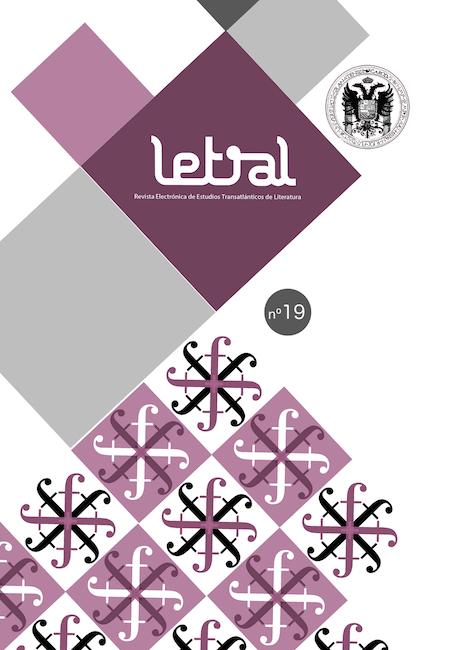The Manipulation of Literary Fame Across Borders: Arreola, a Humorist
DOI:
https://doi.org/10.30827/rl.v0i19.6672Keywords:
Juan José Arreola, refractions, translation studies, metatexts, paratexts, literary fame.Abstract
This paper discusses the reception of the work of Juan José Arreola inthe English language. It is based on Lefevere’s concepts of rewriting andrefraction. It describes how the fame of an author is manipulated acrosscultures through translations, metatexts and paratexts. Metatexts and paratexts(prologues, introductions, critical accounts, etc.) are discussed asmediators in the reception of a literary work. A series of English writtenpublications that depict Arreola as a humorist is then reviewed. Finally,a general view of Arreola’s reception in English is presented through theanalysis of the introductions to Confabulario and Other Inventions byGeorge D. Schade and Una selección personal/A Personal Selection by VicentePreciado and Ramón Elizondo.Downloads
References
Borges, Jorge Luis (1995). Obra poética, 3. Madrid: Alianza Editorial.
--(1998). Prólogos con un prólogo de prólogos. Madrid: Alianza Editorial. Carballo, Emmanuel (1954). “Arreola y Rulfo, cuentistas”, en Revista de la Universidad de México. No. 7, marzo. México: UNAM. 28.
http://www.revistadelauniversidad.unam.mx/ojs_rum/index.php/rum/ article/view/6201
Castañón, Adolfo (2005). El reino y su sombra. En torno a Juan José Arreola. San Pedro de los Pinos: Ediciones del ermitaño, Minimalia.
Castañón, Adolfo & Palafox, Nelly (2007). Para leer a Juan José Arreola. México D.F.: Tercer Milenio.
Englekirk, John E. et al (1968). An Anthology of Spanish American Literature. New York: Appleton-Century-Crofts.
Flores, Ángel y Anderson, Helene M. (1974). Masterpieces of Spanish American Literature, Volume II. McMillan Publishing Co., Inc.: New York.
González Echeverría, Roberto (1999). The Oxford Book of Latin American Short Stories. New York: Oxford University Press.
González Echeverría, Roberto y Pupo-Walker, Enrique (2001). The Cambridge History of Latin American Literature, Volume 2. U.K.: Cambridge University Press.
Hernández, Jorge F., ed (2008). Sun, Stone, and Shadows: 20 Great Mexican Short Sotries. México, D.F.: FCA.
Jorgensen, Marianne et al (2002). Discourse Analysis as Theory and Method. California: Sage Publications. DOI: https://doi.org/10.4135/9781849208871
Lefevere, André (2000). “Mother Courage’s Cucumbers: Text, System and Refraction in a Theory of Literature”, en The Translation Studies Reader. New York: Routledge, 233.
--(1992). Translation, Rewriting, and the Manipulation of Literary Fame. New York: Routledge.
Louis, Annick (2015). “El autor entre dictadura y democracia, fama nacional e internacional. El caso de Jorge Luis Borges”, en Letral, No. 14, Editorial Universidad de Granada, 17.
Luby, Barry J. y Finke, Wayne H (1986). Anthology of Contemporary Latin American Literature, 1960-1984. USA: Associated University Presses.
Poot Herrera, Sara (2009). Un giro en espiral. EL proyecto literario de Juan José Arreola y otros ensayos sobre su obra. México D. F.: Textos de difusión cultural UNAM, Serie El Estudio.
Preciado Zacarías, Vicente (2016). “Prologue”. Una selección personal/A Personal Selection. Juan José Arreola. Colima: Puerta Abierta Editores.
Schade, George D. (1964). “Introduction”. Confabulario and Other Inventions. Juan José Arreola. Austin: Texas Panamerican Series.
Sommers, Joseph (1965). “Confabulario and Other Inventions by Juan José Arreola; George D. Schade”, en Hispania, Vol. 48, No. 2, American Association of Teachers of Spanish and Portuguese, 394. DOI: https://doi.org/10.2307/336150
Vázquez, Felipe (2010). Rulfo y Arreola: desde los márgenes del texto. México: UACM.
Yurkievich, Saúl (2015). “Juan José Arreola: los plurales poderes de la prosa”. Obras. Juan José Arreola. México D.F.: Fondo de Cultura Económica.
Zavala, Lauro (2004). Paseos por el cuento mexicano contemporáneo. México, D.F.: Nueva Imagen.
Downloads
Published
How to Cite
Issue
Section
License
Revista Letral is an open access journal under a Creative Commons Atribución-NoComercial 4.0 license.
The works published in this journal may be reused, distributed and publicly presented for non-commercial purposes, provided that: cite the authorship and the original source of the publication (journal, publisher and URL of the work).
We strongly recommended you to share our published articles in social and scientific networks, institutional and public repositories, personal or institutional websites, blogs, Google Scholar, ORCID, ResearchID, ScopusID, etc.
The journal allow the author(s) to hold the copyright and to retain publishing rights without restrictions.
We are completely free, both for readers and authors.














